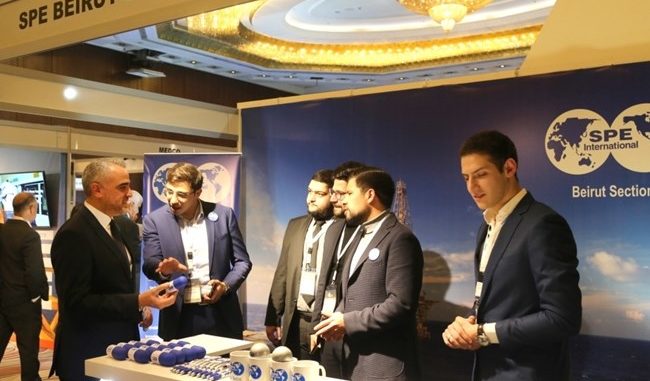
Lebanon will start drilling for gas in maritime Block 4 before the end of the year and intends to launch a second licensing round in January 2020 if everything goes according to plan, a member of the Lebanese Petroleum Administration said Tuesday.
“The oil companies have been conducting some environmental surveys on both Block 4 and 9. They are taking samples of oil and water from the sea. Total awarded a contract to a company to conduct this survey,” Wissam Chbat told The Daily Star on the sidelines of the Lebanon International Oil and Gas Summit, held at the Hilton Beirut Habtoor Grand.
France’s Total, Italy’s Eni and Russia’s Novatek have been awarded contracts to drill in blocks 4 and 9 in Lebanon’s maritime borders.
Chbat said the companies had decided to drill in Block 4 and then start work in Block 9. He said the firms would select the best spot in Block 4, taking into consideration the geological data they collected in order to achieve the best result.
“There is interdependency between Block 4 and 9, and for this reason any commercial discovery in Block 4 will give an indication about the prospects of gas reserves in Block 9,” he added.
Chbat emphasized that any positive or negative results in Block 4 would have a direct effect on Block 9.
“The companies will bring a rig to drill for gas and this mobile rig will explore for gas until they find the right spot. These drill ships will move from one location to another until they strike gas,” he said.
Chbat said the companies had no problem drilling in Block 9 despite objections from Israel. “They have signed the contracts and will not back down. The exploration in Block 9 may be far from the disputed zone with Israel,” he said.
It is difficult to setup a platform in Lebanon’s maritime zone because of the deep waters, Chbat observed.
During the opening ceremony, Lebanese Petroleum Administration Chairman Walid Nasr announced that the Energy Ministry would keep on executing the exploration strategy in blocks 4 and 9, where an environmental survey of the drilling sites has already started.
“Before the end of 2019, the first exploration drilling will take place in Block 4. It will be followed by exploration drilling in Block 9, with the hope of announcing next year, during this summit, the first exploration in the Lebanese sea,” he said.
Nasr added that the ministry would continue its work toward the completion of the second offshore licensing round proposal, which is expected to be presented to Cabinet later this week.
“Our ambitions for the oil and gas sector are big but realistic,” he told the summit. “We hope that Lebanon will be transparent through its management of the natural resources, preserving them for the future generations. To achieve our goal [of offshore oil and gas exploration], we should create the appropriate environment to encourage international companies toward investing in Lebanon,” Nasr said.
He added that such companies’ interest was not limited to offshore exploration, but also extended to the importation of liquefied natural gas to fuel power plants.
“Today, we are in the last stages of the offers’ evaluation before we submit the final report to the government,” he said.
On the sidelines of the summit, Francesca Zadro, trade commissioner at the Italian Trade Agency, told The Daily Star that she was not able to confirm whether Eni would be involved in the second licensing round, but she said she had heard rumors to that effect. “We’ll have to ask the big players, there are rumors but I don’t have direct information. I hope there will be another participation from Eni,” she said.
However, even if Eni isn’t awarded a contract, drilling operations could be very important for Italian businesses, she noted.
“No matter who’s going to do it, Italian companies can provide a lot of complementary services in the oil and gas sector,” Zadro said.
“This is our expertise, which we contribute all over the world. We are present in all countries that have an oil and gas industry.”
Zadro could not specify how many Italian companies were currently working in oil and gas in Lebanon or could be in the future, due to ongoing developments in the nascent sector and the potential for Italian companies’ involvement at so many levels in the process.
But she said any cooperation would be mutually beneficial and would aim to stimulate the local Lebanese economy.
“What we always say to Italian companies is that the real added value of doing business in Lebanon is to do a partnership, as this way you create local jobs.”
Zadro also expressed belief that Italians and Lebanese “strongly complement each other.”
“We have the products and you have the managing skills. I strongly believe the Lebanese are tremendous entrepreneurs and networkers, all over the world. This is an incredibly important asset.”
BY DAILYSTAR | LEBANON
